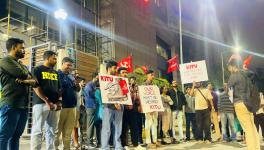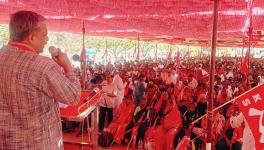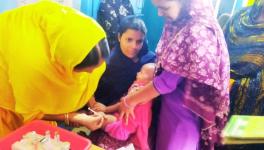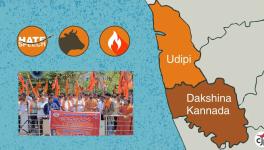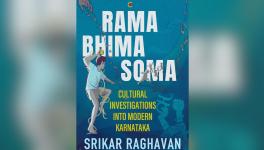'Struggling to Make a Living': Teachers of Disabled Students Protest for pay Hike in Karnataka
Around 1,000 special school teachers gathered at Freedom Park, Bengaluru, on Wednesday to demand a hike in pay for the teaching and non-teaching staff. The teachers had come from at least 20 districts of Karnataka. The special schools are meant for children with disabilities who cannot attend regular schooling.
Thes special schools are maintained by trusts and NGOs, but the government pays an honorarium based on the roster of teachers and students. However, this amount translates to meagre pay scales for the teaching and non-teaching staff as they say that the current salaries do not cover their cost of living.
The honorarium to schools is paid under the Child Centric Scheme (CCS), which was launched in 2010-11. Before the CCS, selected schools were supported by the Grant-in-Aid Code scheme (GIA), which was started in 1982. The new scheme was designed to encourage a higher proportion of student enrollment. It had a lofty goal of achieving 100% literacy among children with disabilities.
According to the 2011 census, there are 13,24,205 differently-abled persons in Karnataka, of which 3.8 lakh were children between the ages of 0-19 years. However, the low pay scales make it hard for the staff to sustain themselves. It also discourages young people from entering the profession.
Praveen, 32, is a teacher at a special school run by the Sarvodaya Service Society in the Bengaluru Rural district. He is originally from Gadag, and had come to Bengaluru eight years ago to work at the school. He lives in a rented accommodation for Rs 4000/month. He said, “We have 75 children and 12 teachers in our school. We teach our kids about colours, numbers, money, eating skills, toilet skills, domestic tasks, and much more. We help them achieve short-term and long-term goals. We want them to live an independent life." He further elaborated saying, "When I started my career eight years back, I was getting paid Rs 3,500/month. Now, I’m earning Rs 13,500/month. If the government revises our pay, we can also live a good life. My batchmates from college are working in large companies and earning well. Sometimes, I wonder if I made the right career decision.”
In order to work as a teacher in a special school, the teachers need to have a Diploma in Special Education, as well as an additional certification from the Rehabilitation Council of India (RCI). They have to renew the RCI certification every five years. This process involves attending seminars in different districts of the state and usually costs them Rs 2,000-4,000 per seminar. The renewal is a must because the teachers are trained in latest therapies and teaching techniques in their respective fields. However, these expenses are borne by the teachers themselves and are taking an unfair chunk out of their earnings.
Gowramma, 50, is a teacher at the Sunaad school for the Hearing Impaired, in Bengaluru. She is originally from Ramanagara district, but has taken a rented accommodation in the capital. She said, “I have to pay Rs 11,000/month as rent for a one BHK house. I have two daughters and aged parents to take care of and my salary has never been sufficient to meet our expenses. When I started my career in 2007, my salary was Rs 4000/month. We don’t have any hope of getting pension. We work so hard, we have many qualifications, but even today, we don’t earn as much as watchmen.”
Vasant Kumar Shetty, secretary, Karnataka State Association for Special Educators and Supportive Staff, said, “The money earned by teachers cannot be called a salary. It is an honorarium being paid by the government. In the state, only 141 schools are getting honorariums under the CCS scheme, and 32 schools are getting grants under the GIA scheme." He pointed out, "Teachers covered by CCS and GIA schemes have the same qualifications. However, only teachers that come under the GIA scheme earn salaries equivalent to primary school teachers (in regular government schools). There is no need for this disparity."
While the teaching staff is grossly underpaid, the condition of the non-teaching staff is even worse. Umesh Angadi, 53, from Haveri town, works as a peon in a special school. “When I first started this job, I didn’t get a salary. I was being paid with meals. Now, I earn Rs 6000/month. I wanted to help children, I didn’t ask for money. Now, expenses have gone up, and daily essentials have become expensive." He added,that his wife is an Anganwadi teacher earning around Rs 10,000/month. "We have around eight to nine members in our household. We are struggling to make a living," Angadi said.
The children at special schools may be afflicted with mental or physical disabilities of varying severity. The common issues are mental retardation, speech, visual, hearing impairment, or sometimes a combination of these. Teachers say that working with special-needs children requires an extraordinary amount of patience and care. Moreover, most children come from working-class families who cannot afford expensive treatments. The association estimates that there may be only 2,500-3,000 qualified professionals working in the field of rehabilitation and special education. Further, there is around 3,000 non-teaching staff as well.
The association has given the government time till October 2 (Gandhi Jayanti) to hike the honorariums. They have threatened to start a fast-unto-death if their demands are left unheard.
Get the latest reports & analysis with people's perspective on Protests, movements & deep analytical videos, discussions of the current affairs in your Telegram app. Subscribe to NewsClick's Telegram channel & get Real-Time updates on stories, as they get published on our website.









